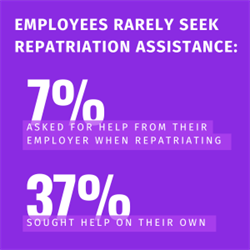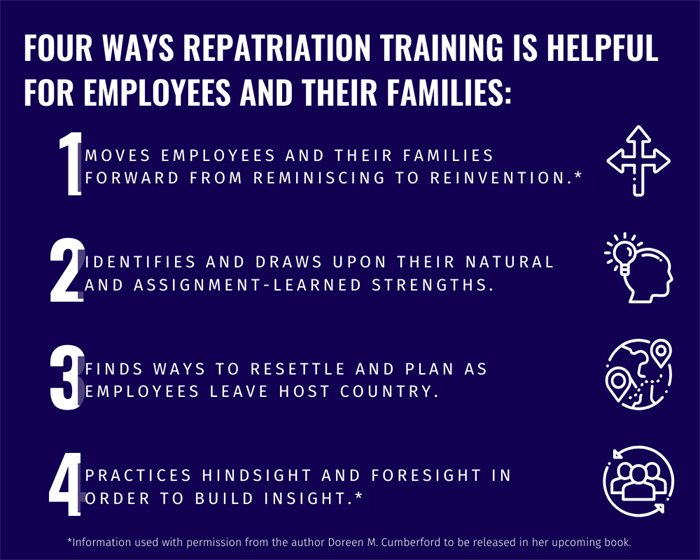
Blog
Why Repatriation Training Is an Integral Part of Talent Management

While an international assignment is a big commitment both for your employees and your organization, the benefits may also be sizeable. An assignment gives your employees the opportunity to grow, develop and gain a global mindset that is so greatly valued in today’s business climate. And it helps your organization meet its critical business needs by investing in your employees’ skills, talents, and competencies and by helping to attract and retain top talent to compete in an evolving workforce.

Effective, well-developed and well-delivered repatriation training, conducted in the right place at the right time, can help both you and your employees make the most of this considerable investment.
Repatriation training has evolved to be a high priority for companies who want to help develop and broaden their key talent. The training is an integral part of the total international assignment process and contributes to an employee’s ability to more quickly and effectively transition to the home country. It also helps employees and family members recognize and deal with challenges that may arise during the transition period. Additionally, repatriation training helps provide closure or context for the international assignment and create an intervention mechanism when the repatriation process is not meeting the individual’s personal or professional expectations.
Reasons Employees Leave After An Assignment*
 |
 |
 |
Repatriation training can integrate career management strategies, which research has shown is the top issue concerning employees returning from an international assignment. Using the repatriation training time to plan how to capitalize on the skills developed on assignment is perhaps the single most important piece in the international talent management cycle when you want to integrate the international assignment experience with their management development and succession planning processes.
Importance of Repatriation Training
Sirva understands that effective repatriation training improves the chances that high-performing employees will stay with the company once they return from assignment, and can be used as a tool to minimize international assignee attrition.
From the perspective of employees and their families, many are surprised to learn that “coming home” after an assignment overseas can be extremely difficult. Repatriation training teaches employees about the normal emotional, logistical and personal challenges that come with returning home. Employees may initially reject the notion that they need training, and some perceive that repatriation training is really therapy in disguise. These ideas go away quickly once employees become involved in the training process and learn to understand its value.

The best practice in repatriation training programs allows for the training to take place just before employees and family members return to their home country. While training certainly can take place once employees have returned home, pre-departure training enables employees to proactively plan for their return home. Repatriation training focuses on creating an individualized action plan that can leverage the knowledge, awareness and skills gained while on assignment that can be applied within the home organization.
It also enables employees and their families to repatriate more successfully in the following ways:
- Employees begin the process of understanding the context and meaning their international assignment will have going forward. This is an important step for employees who often complain that no one at home understands” the value and importance of their overseas experience.
- Taking the time to put their assignment in context allows participants to begin the process of discovering how they have changed, what they have learned, and what pieces of the assignment they want to include in their lives when they return home.
- Repatriation training also helps employees and family members recognize the skills and abilities learned during their overseas assignment. Best practice repatriation training programs focus on ways they can apply their new competencies in their personal and professional lives.
In Summary
Returning employees often are focused on the logistical process of their assignment ending, including moving back to their home country and getting ready to take a new assignment, that they don’t consider all that they have gained during their international experience. Repatriation training provides concentrated time and a proven process to help employees focus on what they have learned and experienced and how they will be able to apply their knowledge in the future for career progression. This concentrated and meaningful time becomes the linchpin to successful repatriation and for high levels of ROI for companies and their employees. Your organization ultimately benefits by having a pool of highly skilled, engaged employees who can articulate the company’s global business goals.
For more information on how Sirva can help you develop an effective repatriation program to support your organization’s strategic talent development goals, please email us at concierge@sirva.com or reach out to your Sirva representative.
*Stats are used with permission from the author Doreen M. Cumberford to be released in her upcoming book, Unsettled: An Expat's Guide to Returning Home with Ease and Grace




